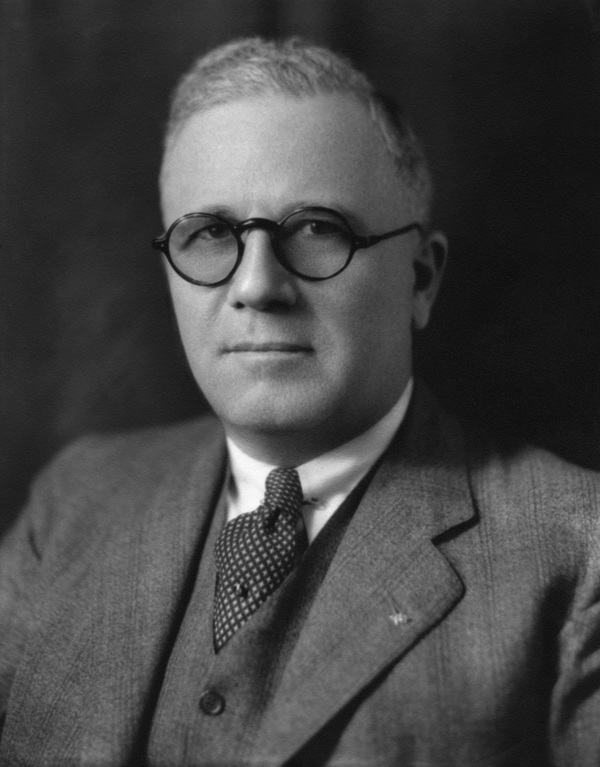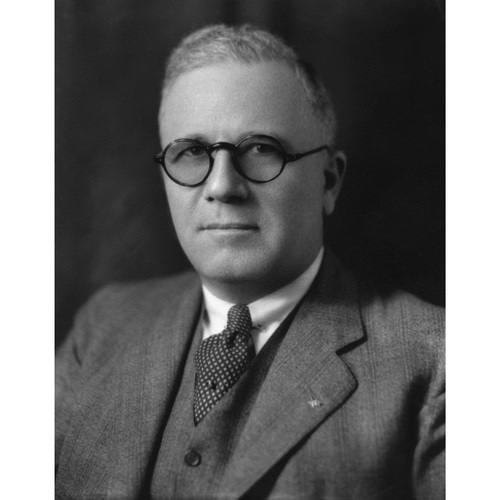
Source: Link
BELL, GEORGE MELROSE, businessman, newspaper publisher, and radio proprietor; b. 6 Sept. 1884 in Brandon, Man., son of George Alexander Bell and Elizabeth Smith; m. there 9 July 1908 Edna Mae Parkin, and they had two sons and two daughters; d. 19 March 1936 in Calgary.
George Melrose Bell grew up in Melita, Man., where his father worked in the agricultural-implement business as an agent for the Massey-Harris Company. The family moved to the District of Saskatchewan in 1903, when George Alexander Bell was appointed homestead inspector for the land district of Estevan. Five years later Bell Sr entered politics as a Liberal; he served as member for Estevan in the Legislative Assembly and as provincial treasurer from 1912 to 1917, as well as minister of telephones from 1913. George Melrose Bell was close to his father, who had been a blacksmith, and would later keep his father’s anvil in a prominent place in his office.
As a young man, he was a keen sportsman. He began his working life as a clerk in the railway mail service and rose quickly to become assistant postmaster for Regina in 1909 at the age of 25. But he soon tired of this career. Together with John Henderson Mitchell, he launched an insurance, real-estate, and financial agency in 1912 under the name Bell and Mitchell Limited, which later opened branches in Winnipeg and Vancouver. In addition, Bell became president of the Sanitary Bakery Limited, Western Implement Limited, Canada West Electric Limited, the Ronald-Smith Cultivator Company, and the Agricultural Insurance Company, as well as a director of other enterprises in Regina. Early in his career he managed paving contracts for the Alberta roads system, an experience that eventually led him to acquire other businesses in Calgary, where he maintained a suite in the Palliser Hotel.
An entrepreneur with a “spirit of adventurousness and interest in new things,” Bell received 4 of the first 21 licences for private commercial broadcasting issued by the radio branch of the federal Department of the Naval Service in 1922: CHCF Winnipeg, CKCK Regina, CFAC Calgary, and CHCA Vancouver. In 1928, through the Albertan Publishing Company, he also procured the licence for CJCJ Calgary when the original owner lost control of the station. Beginning in 1934, he played a major role in the development of Turner Valley and other oilfields in Alberta and in gold-mining in British Columbia.
Bell is best known for his involvement in newspaper publishing. He became president of the Leader Publishing Company in Regina in 1920 and of Star Publishing Limited (Saskatoon) three years later. In 1926, with Charles Edwin Campbell, he purchased the Edmonton Bulletin [see Frank Oliver (Bowsfield)] and the Albertan Publishing Company, which issued the Calgary Albertan. After two years Bell and Campbell divided their interests, Bell keeping the Albertan and the associated semi-monthly Western Farmer. His publishing activities grew when he joined S. L. Ross of Regina in founding the Northern Mail, a weekly in The Pas, Man., in 1928. The following year he expanded into British Columbia through the purchase of the Vancouver Star. This acquisition would leave his estate owing over $400,000.
When Bell and Campbell took over the Albertan, Calgary’s morning newspaper, its situation was fragile. The rival Calgary Daily Herald feared that the Albertan might have to enter the evening market in order to survive. Indeed, between 1932 and 1936 the Herald paid the Albertan a monthly fee not to publish an evening edition. This arrangement was suspended between May and December 1934, when the Albertan unsuccessfully switched to evening publication. Bell negotiated an agreement in 1936 to acquire the Herald, but this plan ultimately failed.
He recognized the importance of the media, particularly radio, in the province’s politics. While nominally a Liberal, he was a staunch supporter of the Social Credit movement and was prepared to use his business acumen to benefit its aspirations as well as his own interests. Before Social Credit came to power in 1935, Bell not only gave the movement and its leader, evangelist William Aberhart*, positive coverage in his newspaper but also invited Aberhart to submit a number of columns. Aberhart saw the Albertan and its associated radio station, CJCJ, as friendly, and Social Credit members negotiated an option to buy the paper and the radio station from its willing owner. The Albertan, upon absorbing the weekly Alberta Social Credit Chronicle, was intended to become the official organ of the Alberta Social Credit League, and for a short while it served that function.
Although Aberhart at first publicly denied any knowledge of plans for the acquisition, he was in fact a partner in the company that held the option to purchase. Furthermore, Charles Read Pearce, secretary-treasurer of Aberhart’s Calgary Prophetic Bible Institute, was made vice-president of the Albertan Publishing Company. Aberhart used his pulpit to persuade Social Crediters to buy shares so that they could exercise their option to buy the paper. The rival Edmonton Journal was outraged. This action on the part of Social Credit was “too much in line with what has been done in Germany and Russia to be to the liking of Canadian citizens.”
Bell’s support for Social Credit was a wise business decision. The change in focus nearly doubled the Albertan’s daily circulation to about 27,000. However, two months after negotiating the deal in 1936, he died of a heart ailment at the early age of 51. The Albertan and its new owners, Bell’s sons Gordon and George Maxwell* (Max), continued to be staunch allies of the Aberhart government, but the paper’s editorial position gradually moderated. Social Credit supporters could never raise enough money to purchase the paper, and the option would be abandoned in 1939.
A Presbyterian, George Melrose Bell was a long-time freemason and a Shriner at the time of his death. Because of the Great Depression, he left his estate in chaos, and it would be his son Max who re-established the family fortunes and built a newspaper empire.
GA, M 6086, M 7003, M 9336, PA 99, PA 1487, PA 2807, NA 5235; M 6991, file 12. Man., Dept. of Tourism, Culture, Heritage, Sport and Consumer Protection, Vital statistics agency (Winnipeg), no.1908-002884. Albertan (Calgary), 20 March 1936, 24 July 1972. Calgary Daily Herald, 20 March 1936. Alberta, Aberhart, and Social Credit, comp. J. A. Boudreau (Toronto, 1975). Alberta newspapers, 1880–1982: an historical directory, comp. G. M. Strathern (Edmonton, 1988). D. R. Elliott and Iris Miller, Bible Bill: a biography of William Aberhart (Edmonton, 1987). Alvin Finkel, The Social Credit phenomenon in Alberta (Toronto, 1989). A history of Canadian journalism (2v., Toronto, 1908–59), 2 (W. A. Craick, Last years of the Canadian Press Association, 1908–1919 …, 1959). Pioneers and prominent people of Saskatchewan (Winnipeg and Toronto, 1924). H. J. Schultz, “William Aberhart and the Social Credit Party: a political biography” (phd thesis, Duke Univ., Durham, N.C., 1959). Mary Vipond, Listening in: the first decade of Canadian broadcasting, 1922–1932 (Montreal and Kingston, Ont., 1992). Wireless and Aviation News (Toronto), April 1922: 23.
Cite This Article
Frits Pannekoek, “BELL, GEORGE MELROSE,” in Dictionary of Canadian Biography, vol. 16, University of Toronto/Université Laval, 2003–, accessed April 26, 2025, https://www.biographi.ca/en/bio/bell_george_melrose_16E.html.
The citation above shows the format for footnotes and endnotes according to the Chicago manual of style (16th edition). Information to be used in other citation formats:
| Permalink: | https://www.biographi.ca/en/bio/bell_george_melrose_16E.html |
| Author of Article: | Frits Pannekoek |
| Title of Article: | BELL, GEORGE MELROSE |
| Publication Name: | Dictionary of Canadian Biography, vol. 16 |
| Publisher: | University of Toronto/Université Laval |
| Year of revision: | 2015 |
| Access Date: | April 26, 2025 |



